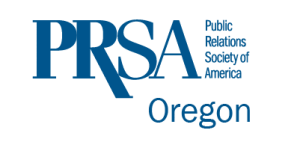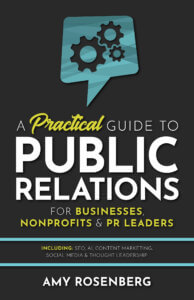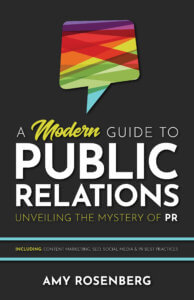
Strategies for Maximizing Your Next Speaking Engagement Before, During and After
Landing a speaking engagement can be an incredible boost for a thought leader. Not only does it provide a platform to elevate your brand, but a speaking engagement is also a chance to demonstrate your expertise, promote your business or sell your latest product to a group of peers. So if you’ve landed a speaking gig, it’s imperative to make the most of these valuable opportunities. Even though the engagement itself may only last a few hours, you can do plenty in the days surrounding the event to maximize its impact.
Before the Event
The days and weeks before your speaking engagement is your opportunity to prepare. That includes dialing in your presentation and spreading the word about your participation. You can break these activities down into three categories.
Prepare & Practice
Your first task should be preparing a compelling and relevant presentation and practicing your speech until you’ve mastered it. It won’t be easy to make an impression if your remarks aren’t well thought out or if you are constantly fumbling over your words. Try recording your practice sessions, which can be an excellent tool for self-critique and a fantastic way to create content you can use in your promotional efforts. If you’re moderating a panel discussion as part of your engagement, use this time to learn the topic thoroughly and research the other panel members to develop your line of questioning. For more speech prep, listen to Carmie McCook’s PR Talk episode.
Network with Other Presenters
If your speaking engagement is part of a larger conference or trade event, you should spend some time networking with fellow presenters. Most likely, you’re working in the same industry serving the same people, so you may find opportunities to create complimentary content. You may also discover opportunities to co-promote your appearances through podcast interviews, blog content, social media posts or other efforts leading up to the event. At the very least, reaching out to fellow presenters is a great way to build new relationships with other industry leaders that could turn into new opportunities down the road.
Promote to Your Audience
Promoting your speaking engagement with your audience is also critical, which is easy enough if you’re an influencer, consultant, or small business owner. Start by sharing the details on social media, and include your contact information in the posts. You could also write a blog post, record a podcast episode on the topic you’ll be speaking about, or be a guest on another podcast. The goal isn’t necessarily for your audience to attend the event. Instead, you can use this speaking engagement as an opportunity to demonstrate your expertise within your professional community.
If you’re speaking at an event on behalf of your employer, promotion could take a little more work. You can still share details on your social accounts, but it would be ideal for your employer to share your event with its audience as well. So don’t forget to notify the social team about the details and leave enough time to complete whatever internal approval processes are in place.

During the Event
The speaking engagement is short, so making the most of this limited time is critical. Here are three areas to focus on whether you’re keynoting an industry gathering, speaking at a community event or hosting an online webinar.
Create Promotional Content
You’ve put a lot of work into preparing your presentation, so look for creative ways to reuse that content. Make sure someone is recording your speech to use that content later. A 45-minute presentation can break down into dozens of shorter clips you can use on social media for months and years to come. If you’re attending an event, post to social media about your involvement, record content with other presenters or go live to give your audience a seat at the table.
Have a Call to Action
Don’t forget to include something your audience can request or take away after your remarks are over. Maybe it’s a free chapter of your book, a helpful whitepaper or even a simple request to subscribe to your podcast. Including a call to action in your remarks, even just in the introduction, is a great way to build an email list you can use to promote your activities later. But remember, the audience isn’t there for a sales pitch, so your call to action should never come at the expense of your presentation.
Make Yourself Available
Your job is not over once your speech ends. So plan on networking with other presenters and organizers at the event. Making these connections will help you get invited back in the future but may also lead to other opportunities. If the media is covering your industry event, make yourself available to journalists as well. Most importantly, take time to engage with other attendees. You’re there as a resource for people who are paying to attend, so go to the happy hours and parties and support other speakers. Answer questions when you can and help make connections. This valuable networking can help with career development and new business generation.

After the Event
Sometimes the most valuable activities can happen in the days and weeks after your speaking engagement ends. However, this depends on how well you follow up with potential new opportunities.
Conduct Follow Up
Executing whatever deliverables you promised attendees as part of your call to action is critical. That means sending out your book chapters, whitepapers or whatever to the attendees who want them. If you have another speaking engagement lined up, this is a great time to include those details so you can continue building your audience.
It’s also important to follow up on all those business cards you undoubtedly collected. This step could be as easy as sending a LinkedIn invitation with an accompanying note or reaching out with an email suggesting potential next steps. This phase is where you begin laying the groundwork for future activities.
Share What You Learned
Your existing audience is probably also wondering how your speaking engagement went, so you should provide an update by writing a blog or recording a podcast after the event ends. Recapping the broader event and sharing what you learned can be a great approach because your audience would probably find that information particularly valuable. Giving event organizations and other attendees plenty of love in your social media posts is also appropriate and can go a long way towards potentially being asked back.
Request Feedback
Asking event organizers to share any feedback they collected on your presentation is another crucial task to add to your to-do list. While critical feedback may sting a bit, it can offer you guidance on improving your presentation skills. You can also use the positive feedback you receive in your marketing materials as you promote yourself for future speaking engagements.
The Centerpiece of Your Marketing
Speaking engagements are a fantastic way to boost your brand and industry reputation, and they can also play an important role in driving new business. But it takes careful planning and execution to maximize these benefits beyond the day of the event. By networking with other event speakers, treating your presentation as a valuable piece of marketing collateral and following through with potential opportunities, you can turn a speaking engagement into the hub of your marketing activities.

![How to Beat Speech Anxiety with Carmie McCook [Podcast]](https://www.veracityagency.com/wp-content/uploads/Carmie-McCook-800x600-1.jpg)





